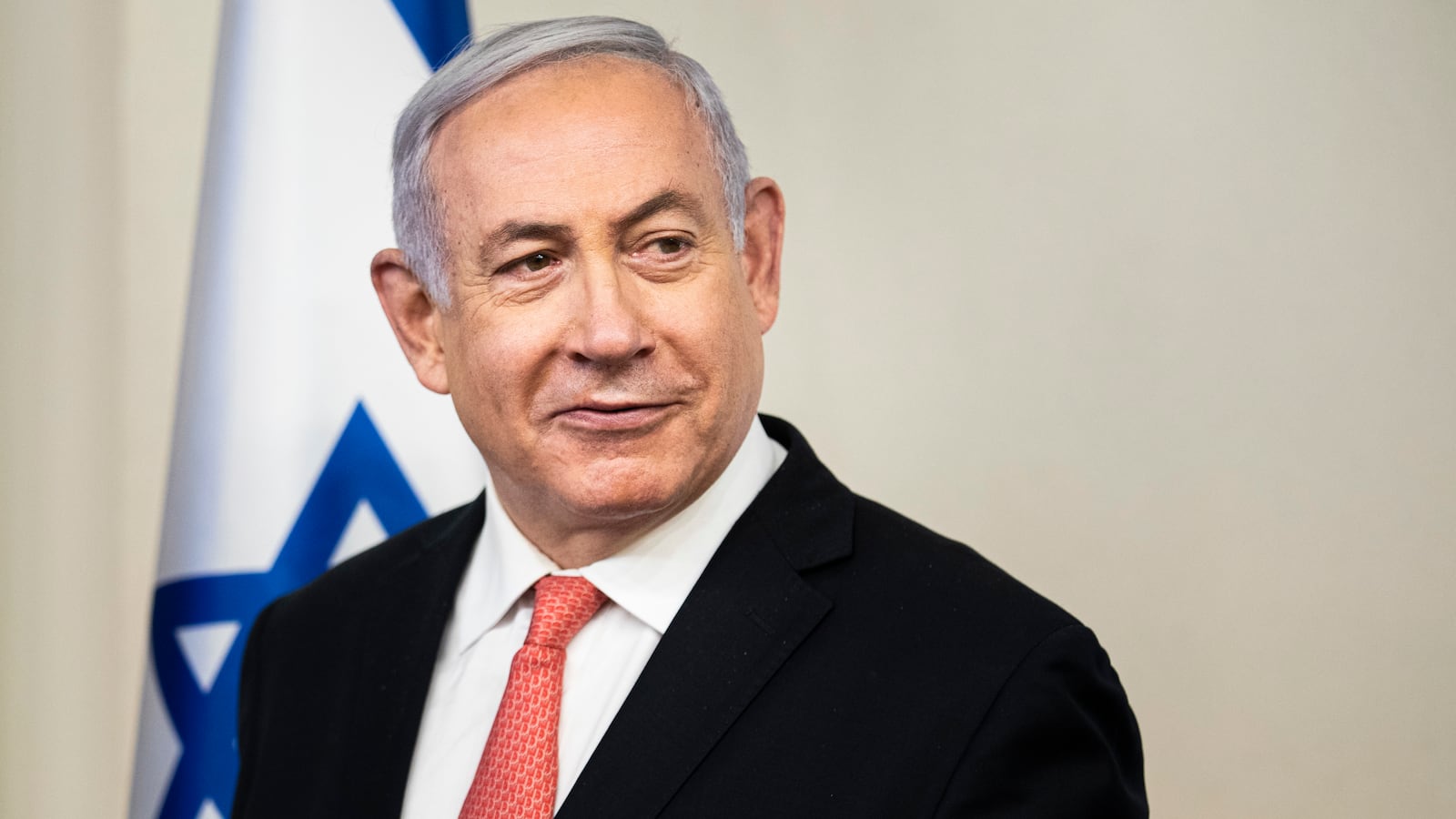Hadas Klein, the latest witness in the corruption trial of former Israeli Premier Benjamin Netanyahu could have come from central casting.
In two days of spellbinding testimony, Klein, 57—trim, expressive and self-confident, and coiffed in a neat carré—came across as exactly what she is: a top-of-the-line executive assistant who was witness to extraordinary events.
About midway through Wednesday’s recitation, her testimony took a turn that could have been taken from a mafia tribunal. Klein, aide-de-camp to Arnon Milchan, the Hollywood producer and a close friend of Netanyahu for the past thirty years, was describing her efforts to conceal the identity of the beneficiary of her purchases from ‘Cookie,’ the owner of a tony cigar boutique in the posh Tel Aviv suburb of Herzliya.
“Cookie—that’s his name,” wanted to know who was enjoying the Cuban cigars she bought from him to the tune of about $27,328 per annum.
“I was paying for everything on my personal credit card because I was trying to shield Netanyahu. I didn’t want to put it on Arnon’s credit card to shield him. Cookie never gave us a discount, but he’d give us Dominican cigars as gifts… I accepted them and asked Arnon about it, and he said, ‘Sure, why not?’ And of course, nothing stayed with us. We transferred the gifts to Mr. Netanyahu, too.”
Cookie pressed her. “Cookie told me that only a very small club of people in the country consume this length and diameter of cigar, so who is it?”
Two Monte Christo cigars cost $630, she recalled. Netanyahu enjoyed dunking them in Cointreau before indulging in a smoke, she said.
But Klein brought more than her memories. A meticulous recordkeeper, she provided investigators and the court with all the receipts, invoices, and bank transfers related to these purchases and many more. Her text messages relating to the procurements and their disposal were pitilessly projected onto a screen in Judge Rivka Feldman-Freidman’s small courtroom.
Klein was the central cog of a full-blown “well-organized mechanism” of Netanyahu’s illegal demands for goods from wealthy “friends,” and the distribution of the resulting "gifts," which Israeli prosecutors believe constitute graft.
Like Cassidy Hutchinson, Klein was a witness to the Netanyahus’ most intimate behavior. Like Hutchinson, she was overlooked by the figures in power. And like Hutchinson, she framed her testimony as an act of patriotism.
“I am fulfilling my obligations as a citizen of this country,” she told journalists in the hallway, surrounded by police bodyguards. “I was asked to provide testimony, and that is what I am doing. I am doing what would have made my parents proud.”
During her testimony, which also included unflattering depictions of Milchan, Klein fretted about the possibility of losing her job.
Klein is unlike the previous big-name witnesses in Netanyahu’s trial, in which he faces counts of bribery, fraud, and breach of trust in three separate criminal cases that involve, in one way or another, allegations that he abuses his position for personal profit.
Both Nir Hefetz, the onetime head of Netanyahu’s fearsome communications shop, and Shlomo Filber, the former director-general of Israel’s communications ministry under Netanyahu, were riveting but reluctant witnesses who testified for the state only as part of plea deals they hope will keep them from criminal prosecution.
Hefetz testified that “in everything having to do with media, [Netanyahu] is much more than a control freak… Netanyahu spends at least as much of his time on media as he spends on security matters.”
Echoing Netanyahu, Filber called the trial “a witch hunt,” and unenthusiastically described receiving direct orders from the prime minister, who demanded regulations be “loosened” for Shaul Elovitch, a crony who headed Israel’s largest communications conglomerate to the tune of hundreds of millions of dollars.
Klein, conversely, testified voluntarily, even with what appeared to be relief, and is not suspected of any crime.
She described Netanyahu’s repeated calls to her cellphone, claiming that he had received the authorization of “legal counsel” to the stream of gifts he demanded be provided to his wife. “You don’t understand,” the prime minister griped to his friend’s assistant. “She gets upset only because the media is massacring. Give her everything she wants. It is all allowed, I checked. Don’t spill her blood like the media does.”
Klein described a massive staff apparatus through which the Netanyahus appropriated an unlimited flow of luxury goods from Milchan, who grumbled about it, telling Klein “we have no choice. There’s no other way with them,” and Packer, who she described as a vulnerable Netanyahu groupie.
Milchan, she said, “enjoyed the proximity to power. He liked being able to say he was friends with the prime minister,” but was an unhappy participant in the scheme that involved concealing cases of pink Dom Perignon champagne in coolers.
In March 2016, Klein recalled, when she returned home from a private trip to Cuba—her 50th birthday celebration—a furious Netanyahu allegedly complained that she had only sourced Cohiba 54 cigars for him, and not his favorites, the Cohiba 56es. “You couldn’t get them anywhere,” she said. “There just weren’t any.”
The Netanyahus spoke to her in code, referring to cigars as “leaves” and champagne as “rosy” but were direct and to the point about other demands, Klein claimed. She said that Sara Netanyahu’s demand for a specific gold ring and necklace from a trendy Tel Aviv jeweler was transmitted to Klein following a conference call in which Milchan, who is expected to testify later in the trial, secured the explicit authorization from the prime minister.
Klein’s testimony was full of details and titillating pearls. In contrast with Netanyahu, she described Yair Lapid, Israel’s current caretaker prime minister—Netanyahu’s rival in the upcoming 2022 election—refusing delivery of a bouquet Milchan sent when he was appointed finance minister in 2013. When the well-connected Milchan once forgot an expensive set of headphones at Lapid’s home, “Arnon told me to tell him just to leave them there. Yair called and told me, ‘No way. Send the driver to take it.’”
She relayed recollections of the time Hugh Jackman allegedly met with Netanyahu, which became yet another opportunity for the prime minister to make off with cigars. Judge Moshe Baram, a member of the panel of three judges hearing the case, asked Klein how she knew “the cigars weren’t for the actor?”
Klein replied, “because I was there. The cigars were for Netanyahu.”







